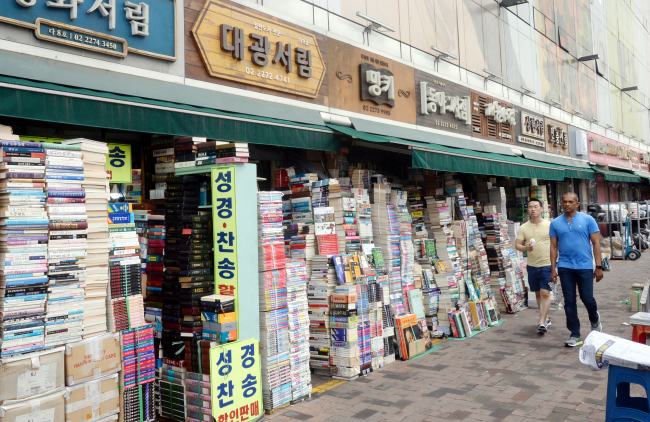Over near the sleek Dongdaemun Design Plaza are towers of shops that carry fast fashion clothing at the forefront of popular trends. Head north to Cheonggyecheon, the 10 kilometer-long manmade stream traversing Seoul, and there is a small street that holds some 20 stores stacked with piles of old, tattered books.
The “used books street,” as it is called among locals, flourished in the 60s and 70s, according to Hyun Man-soo, the owner of a used bookstore and the president of the association of storeowners on the street.
“During the heyday, there were as many as 120 used bookstores in this area,” said Hyun, who jumped into the business some 30 years ago when the used books market was thriving.
During the 80s, the weekends would see the street filled with crowds of families seeking wholesome fun or couples on dates. On weekday afternoons, students would come in hoards after class to rummage for good deals on textbooks and novels.
“My thought was that selling books was a form of selling knowledge, selling education,” said Hyun. “And buying used books would be a more affordable way to gain knowledge. I felt a huge sense of pride that I was participating in an important cultural venture. I felt certain it was a business that could never disappear.”
But with the advent of online used book markets such as Aladdin and Yes 24, e-books, and a culture that values novelty, he and his fellow storeowners are now just short of closing shop.
“I didn’t think the used book business could be taken over by big companies,” said Lee Ki-sook, another used bookstore owner on the street. “But since around 15 years ago, it’s become difficult to make a living.”
Nowadays, the types of customers that visit the street are mostly an older clientele in their 50s or 60s who want to reminisce about their youth.
Efforts for revival
Ongoing efforts are being made to infuse the archaic street with new ideas.
The Seoul Metropolitan Library hosted a festival for used books at the Dongdaemun Design Plaza in June, letting storeowners from the Cheonggyecheon street install booths and sell their books there. Young college volunteers helped promote the books during the festival, striving to spark new interest in the recycled literature.
In 2015, a club of Yonsei University students created a service that encases the used bookstore shopping experience in a box and delivers it to individual homes.
Called “Project Book It Out,” the venture delivers a curated selection of books to subscribers, who choose from six themes -- sensibility, space, urgency, reflection, knowledge, and random. Three used books that fit each theme are then brought to the subscriber’s home for a 17,500 won ($15.23) fee.
“We’re targeting readers who want to read, but don’t know which book would be worth a read,” said Choi Yoo-jin, the project’s former team leader.
We go through the same experience in brick-and-mortar bookstores, Choi pointed out. Consumers eye the shelves of bestsellers or new books to receive recommendations for good reads.
“In this service, the people doing the recommending are storeowners who have handled used books for decades,” she said.
Over on Daehagno, the youthful street home to a throng musical theaters in northeast Seoul, the Yonsei University students have installed a vending machine for used books. The books are wrapped and labeled only with their main themes – such as “romance” or “horror.”
Like the stores on the old street, it’s an offline method of shopping for used books, but wrapped in a new experience.
Users choose a book at random, unwrap it and discover an unexpected story, said Ji Yoon-seo, a 26-year-old college student who purchased a book from the machine. “It’s like surprise gift,” she said. “It’s fun.”
By Rumy Doo (
doo@heraldcorp.com)








![[Today’s K-pop] Blackpink’s Jennie, Lisa invited to Coachella as solo acts](http://res.heraldm.com/phpwas/restmb_idxmake.php?idx=644&simg=/content/image/2024/11/21/20241121050099_0.jpg)